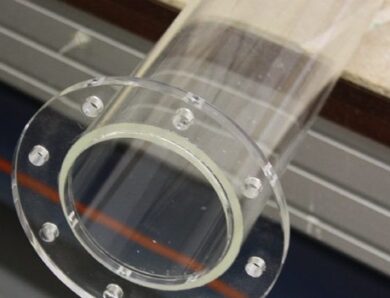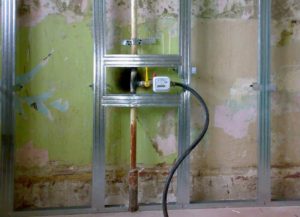Twisted decorative pipe: features and main characteristics
Decorative pipes are products, which are used for decoration indoors and outdoors. The inner part of this product is no different from a normal pipe, however, the outer wall has a variety (depending on the case) relief. To date, the range is different in shape, as well as the size of decorative twisted pipes is incredibly wide.
Twisted decorative pipe - the basis of a variety of structures and structures
For what decorative twisted pipes are used?
The main difference from standard hollow parts is their appearance, which is aesthetic. That is why they are used to decorate the interior of rooms, as well as in the production of various structures. Such non-standard products can be used in the same conditions, as well as usual pipes, and in some cases they are more effective.
Such products are very popular in the construction industry, where from them various frame designs are executed. Such designs not only look much more presentable, but also not inferior to ordinary pipes in technical characteristics. Consider the basic structures and elements, in which decorative twisted pipes are used:
- from decorative details often execute racks for arbours;
- various non-standard fences;
- very popular twisted products when installing bars on windows;
- exept this, such details are very popular in the furniture industry.
Twisted pipe can be used as a support in load-bearing structures
Twisted decorative pipes are used everywhere and the demand for them is growing every year. This creates new products in terms of shape and complexity.
Features of production of decorative twisted pipes in the industry
The production of such decorative products is not particularly difficult. In order to perform such a detail you will need an ordinary pipe, usually, with thin walls. The most popular are those products, which are made seamlessly, however, and electric welded parts are suitable for creating a decorative embossed pipe.
For the production of decorative twisted pipes, the workpiece is processed on a special rolling mill. The empty part passes through rolling rollers, resulting in the formation of a certain relief. The position of the rollers is adjustable depending on, what is the diameter of the pipe.
Useful Information! Rolling equipment for decorative twisted products includes three rollers, located on the caliper. It should be noted, that every rolling detail, usually, equipped with individual wire.
It is possible to adjust the caliper, which is used to strengthen the cutter. It allows to process products with various indicators of section and to control an angle of inclination of the section.
First of all before the beginning of the working process it is necessary to set the necessary settings and to adjust elements of the machine so, so that you can install the desired diameter of the workpiece.
After the above actions, erection of calipers and their fixing by means of the adjusting screw in the necessary position is carried out. After that, you can start the process of making a relief part. It is also worth noting, that the notch can be of two types:
- direct;
- helical.
Decorative steel pipes do not look so impressive, as products from non-ferrous metals, but their cost is lower
There are no restrictions on length or material as such. Embossed decorative pipes are also made of ordinary steel, and non-ferrous metals. Buildings made of decorative products look most impressive, made of non-ferrous metals, but, the cost of such products is higher, than steel.
The machine for production of decorative pipes by own hands
Not every homeowner can afford to buy such an expensive product, like a twisted pipe (embossed) decorative, however, if desired, this product can be made by hand. To do this, you need to assemble a homemade machine, on which work on receiving decorative details will be carried out.
Experts do not recommend doing this, who do not understand machines and their devices. And for those, who at least roughly understands the essence of the question - this instruction may be useful.
Consider the main stages of assembly of the machine to obtain metal with a pattern on the outer wall:
- First of all it is necessary to make a special device, which will serve as a support for work on the lathe (lunette). To do this, place three rollers in a certain position.
- Then you need to make the guide elements for the lunette. This will allow the support element to slide on them.
- The electronic part of the equipment must have a motor and a chain drive. The workflow itself is quite simple: round tube is fixed in the chuck, then you need to turn on the transmission.
- Next, you need to bring the support part in this way, so that the rollers fixed the pipe and the lunette began to slide on, previously installed guide elements.
The machine for the production of twisted pipes can be assembled with your own hands, but if a large amount of work is planned, better to buy ready-made
This machine is perfect for irregular or even single use, however, it is not suitable for the manufacture of twisted decorative pipes on an industrial scale. Industrial machines have many advantages, in comparison with self-made: the ability to adjust the angle, variability of processed diameters from 10 to 150 mm, as well as high performance due to speed (120 km / h).
Types and characteristics of decorative profile pipes
Decorative profile pipe is one of the types of metal, which differs from ordinary pipes in that, having a non-standard cross-sectional shape. exept this, the inner diameter of such products is changed, so they are ideal for fencing, and also for formation of frameworks of various designs. The range of profile decorative pipes is quite wide.
Useful Information! To perform various fences, usually, pipes are used, which have a wall thickness 3 mm.
However, there are thin-walled products with a wall thickness of 1,5 to 3 mm. Such profile decorative details are used, usually, in the furniture industry. Details, the wall thickness of which reaches 4 mm, are considered medium and are used for supports in the assembly, as well as chassis parts of various mechanisms. Profile relief pipes can be thick-walled, with wall thickness up to 8 mm. Frameworks of buildings and massive machines are made of such products.
The most popular forms of profile parts with textured faces are considered:
- rectangular;
- square.
The length of such products can be from 6 to 12 meters. Picture on the details, usually, selected for a particular case individually. The cost of decorative profile pipes depends on the volume of production, purchased.
Profile pipes with a relief surface are also popular
Advantages of relief profile pipes
Like any other product, decorative profile hire has its advantages, which are worth paying attention to:
- such products are quite strong and have a long service life. If to use a decorative profile detail for arrangement of a fence, it is recommended to design the future structure correctly;
- use of a relief profile allows to carry out it in combinations with other materials (example, with a brick support of a fence);
- exept this, the relief profile can be adjusted under any span, having previously carried out its measurement and preparation;
- good transparency of the relief profile provides a presentable appearance of the site from the inside, as well as externally. Thanks to this, different plants, growing on the site, that are not shaded;
- one of the main advantages of the decorative profile is a wide selection of products. If desired, everyone will be able to choose something suitable for his taste;
Importantly! Experts recommend periodically applying anti-corrosion coating on decorative profile products, used for fencing. If the anti-corrosion coating is renewed, the service life of such a fence will increase several times.
- Another advantage of such products - high performance compared to conventional, round pipe of the same thickness and with the same cross-sectional indicators.
The above advantages allow decorative profile pipes to occupy a confident position in the modern market of building materials..


